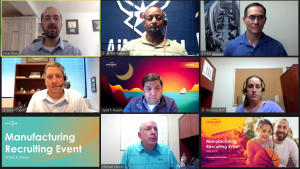
A Purpose-Driven Job Search Can Help You Land Your Dream Position
We’ve all heard of attempting to live a purpose-driven life, but what about conducting a purpose-driven job search?
The ongoing pandemic has untethered many job candidates from prior geographic and job requirement constraints, leaving many with new priorities around what an ideal new job should be.
Salaries, titles, job descriptions, and the benefits package are still prominent considerations when evaluating a new career opportunity. However, more and more candidates, especially those that are earlier in their career journeys, have started to prioritize meaning, work-life balance, and the resonance and alignment of an employer’s mission and values with their own.
What motivated a job candidate to say “yes” to an employer even just a few years back is changing, with mission alignment and the potential to fulfill a candidate’s purpose ascending to “must-have” status among some life sciences candidates.
So what is a purpose-driven job search?
The answer might seem obvious on its face, but there is a great deal of nuance and depth to what this means to individual job seekers. Employers need to understand this when deploying their job search and employer branding strategy, and candidates need to take a step back and think about how finding an employer with a similar purpose and mission can lead to increased productivity, stronger job satisfaction, and longer tenures at an organization.
“To me, job searching with purpose means finding a role and organization that not only aligns with your long-term career goals but also with your personal values. Job searching with purpose means thinking long-term and tactically, and searching for a sustainable career, versus a short-term job,” stated Halsten Sharkey, Life Science Talent Consultant with WorkForce Genetics.
“I personally have some non-negotiable values that I consider when contemplating a career move. As a Queer woman, it is imperative that I align myself with an organization that not only accepts my orientation, gender identity, and pronouns in their entirety but also refuses to work with clients that hold homophobic or transphobic views. It is also non-negotiable that I align myself with an organization that is unabashedly anti-racist: I need to know where an organization stands on the topic of racial injustice before committing to employment,” she added.
A job seeker should take some time to reflect on what values are important to them and then use these values to assess if an employer is a right fit for them. Every job seeker is unique both in the values they hold and what they are willing to accept. As Sharkey mentioned, there might be non-negotiable values, while others might still be important but less so. When job seekers actively search for the right employer fit, finding a company that aligns with their core beliefs might be more critical in the long run than initial salary offers or a shiny, important-sounding job title.
It’s essential to recognize that a purpose-driven job search and saying no to some opportunities means that the job seeker is in the right financial/life circumstance position to do so. Putting mission, values, and purpose as the driving forces behind saying yes or no to a job offer isn’t as viable an option for all job seekers.
“I think deciding what is a ‘nice to have versus a ‘must have’ value requires some soul-searching; It is deeply personal and involves making hard choices. For example, would you be willing to accept a ‘dream’ job offer if the organization in question was not inclusive or welcoming to all types of employees? Are there values that you would be willing to ‘budge’ on, and still feel personally fulfilled?” shared Sharkey.
Defining what values are most important before jumping headlong into the job hunt is a critical first step, but it’s not the only thing to remember when engaging in the job market. Sharkey suggests keeping the following tips in mind when actively seeking a new position:
- Research. It is so easy to access information in this digital day and age, including information on your future employer and coworkers. Do some research on social media platforms, like LinkedIn or professional sites such as Glassdoor.
- Accept that you might lose out on some opportunities. Taking a stand and adhering to a set of values isn’t always easy. However, waiting for the ‘right’ organization is better than working for an organization that doesn’t value your identity in its entirety.
- Understand that your personal brand and reputation are at stake. When you sign an offer letter, you are choosing to align with your employer’s values, mission, and brand. This is a risk you need to mitigate by clearly defining what values are important early in the job search.
In addition, candidates need to delineate corporate mission “eyewash” from authentic values. Do the leg work and dig a little deeper. Great Places to Work awards or a deep corporate philanthropy section of the website doesn’t always mean these values are authentic and deeply held at an organization.
To gauge a company’s mission and values authenticity, Sharkey suggests, “For larger organizations, I would check their Corporate Equality Index score on the Human Rights Campaign website. Smaller organizations are a bit trickier, as concrete data is harder to find online. So, once again, research, research, research!”
“Regardless of company size, a great way to gauge an organization’s authenticity is to ask! Remember that an interview is just as much your chance to ask questions as it is for the hiring organization,” she added.
In the end, candidates need to balance firmly held personal values, financial considerations, and the need for ample benefits, among other factors at play in the job search process.
It’s complex. It’s personal. And it can be tricky.
“This is a deeply personal question that requires soul searching and honesty. Are you willing to sacrifice your values for career advancement? Do you have the privilege to make a career decision centered around your values? The answer will vary from person to person, and I respect that,” stated Sharkey.
“The best advice I can give, as cliché as it may be, is to follow your heart: ultimately, you are the only person who can make these complex, sometimes heart-wrenching decisions. No job is ‘forever.’ There is an immense privilege in being able to tailor your job search around your values and being able to ‘pass’ on job opportunities. However, defining what values matter most upfront and engaging in a purpose-driven job search will increase the odds that you will be happier, more productive, and more likely to stay wherever you happen to land,” she added.
- About the Author
- Latest Posts
Steve brings nearly twenty years of experience in marketing and content creation to the WorkForce Genetics team. He loves writing engaging content and working with partners, companies, and individuals to share their unique stories and showcase their work. Steve holds a BA in English from Providence College and an MA in American Literature from Montclair State University. He lives in Frederick, Maryland with his wife, two sons, and the family dog.






